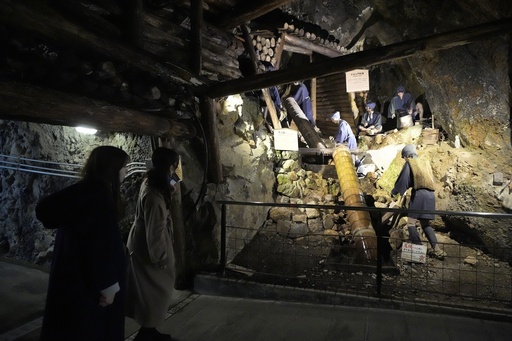
SADO, Japan — A memorial ceremony is set to take place on Sunday near the historic Sado Island Gold Mines, despite a recent announcement from South Korea opting to boycott the event. This notable absence arises from ongoing tensions regarding the forced Korean laborers who worked at the mines during World War II, creating a setback in the improving relations between Japan and South Korea. In recent times, both nations have focused on strengthening U.S.-led security partnerships while attempting to move past historical grievances.
The Sado Gold Mines were designated as a UNESCO World Heritage site in July, following Japan’s recognition of the site’s troubling past and its commitment to holding an annual memorial service for all laborers, including the Koreans who were compelled to work there. However, South Korea’s government has chosen not to attend the memorial, citing unresolved disputes between the two nations as the primary reason for their absence.
Japanese Foreign Ministry spokesperson Masashi Mizobuchi expressed disappointment over South Korea’s decision, affirming that Japan had actively engaged in dialogue with Seoul leading up to the event. The memorial will continue as scheduled at a location adjacent to the mines on Sunday, showcasing Japan’s intention to honor all workers who perished there.
The Sado mines, located off Japan’s north-central coast, operated for nearly four centuries before their closure in 1989 and were once recognized as the world’s leading gold supplier. Historical accounts indicate that approximately 1,500 Koreans were forcibly mobilized to work at the Sado mines, part of Japan’s broader wartime strategy that relied on Korean labor to fill workforce shortages as many Japanese men were fighting in battles across Asia and the Pacific.
Japan contends that all compensation issues relating to wartime labor were resolved through a normalization treaty established in 1965. Yet, South Korea has consistently opposed the World Heritage designation for Sado, arguing that it overlooks the important contributions of Korean forced laborers during the conflict. However, with President Yoon Suk Yeol’s administration seeking to improve bilateral ties, South Korea had ultimately offered its support for the Sado listing.
The Japanese government intends for Sunday’s ceremony to pay homage to “all workers” who lost their lives in the mines, although it has not specifically included references to Korean laborers in its communications. This omission has raised concerns among critics, who assert that Japan continues to ignore its historical record of labor and sexual exploitation during wartime.
Preparations for the memorial appear to have been uncertain until just before the event, hinting at Japan’s reluctance to confront the truths of its wartime actions. Further complicating matters, Japanese parliamentary vice minister Akiko Ikuina—who controversially visited the Yasukuni Shrine, which honors Japanese war dead including convicted war criminals—was designated to represent Japan at the ceremony. This shrine is widely regarded by neighboring countries as a reminder of Japan’s militaristic past.
Ikuina is associated with the political faction led by former Prime Minister Shinzo Abe, known for his attempts to downplay Japan’s wartime atrocities in the past decade. The government’s narrative often employs misleading terms to describe historical events, preferring phrases like “comfort women” instead of “sex slavery,” which have sparked much debate.
South Korean Foreign Minister Cho Tae-yul pointed out that Ikuina’s visit to Yasukuni has surfaced as a contentious issue within diplomatic discussions, leading to the conclusion that there was insufficient time to bridge the gaps between both governments ahead of the memorial. Some South Koreans have expressed their discontent with the Yoon administration’s support for the event without securing a solid commitment from Japan concerning the acknowledgment of Korean laborers’ sufferings, even while agreeing to cover the travel expenses for the families of Korean victims.
